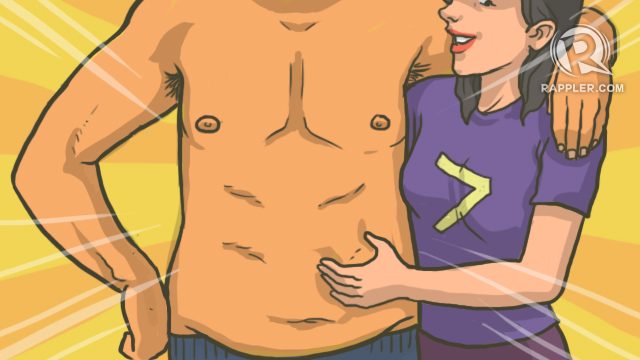SUMMARY
This is AI generated summarization, which may have errors. For context, always refer to the full article.
 In Hemingway’s short story “Three-Day Blow,” Bill tells his friend Nick that “[married men] get this sort of fat married look.”
In Hemingway’s short story “Three-Day Blow,” Bill tells his friend Nick that “[married men] get this sort of fat married look.”
Almost a century later, that “fat married look,” the “dad bod,” is now sexy – and you don’t need to be a father or a husband to enjoy your newly minted average-guy hotness.
According to writer Mackenzie Pearson, the college sophomore who is credited with the term, “The dad bod is a nice balance between a beer gut and working out.“
The dad bod says, “‘I go to the gym occasionally, but I also drink heavily on the weekends and enjoy eating eight slices of pizza at a time.’ It’s not an overweight guy, but it isn’t one with washboard abs, either.”
That a young, attractive woman and her friends came up with it gave many men a reason to celebrate: ciao, six-pack and biceps. Hello, four-cheese pizza and gently sloping beer gut.
What I realized, though, after reading her pithy article “Why Girls Love the Dad Bod” is that, though she uses the word “crazy” and “attractiveness,” her listicle is not about the sex appeal or attractiveness of the dad bod’s Everyman qualities. 
Despite its male body-positive title (and the article’s backhanded compliments), it’s not really about the man at all.
It’s about the woman.
While I know that Pearson’s article was intended as a light-hearted paean (she hadn’t anticipated its going viral) to the average-looking men, stripped of the introduction and the catchy title, it is really about how the dad bods make women feel better about themselves. This confidence boost is rooted in the man’s averageness.
While the defined-abs men “make us feel insecure about our bodies,” the dad bods function as their “skinny” mirror, making the women feel smaller than they appear while simultaneously increasing their self-esteem.
Dad bods make them feel “prettier” in comparison to their partners and more comfortable enjoying cheat days of tacos and beer.
As other essayists have already written, despite #mombod’s trending, these women’s bodies aren’t viewed in a similar desirable way that the dad bods are.
So, in this weight-obsessed landscape that privileges dad bods and where women often stand akimbo in photos (i.e. “the skinny arm”), a heavier, less sculpted man can make them appear thinner or feel thin, even when they have put on a few pounds.
No woman, even the confident ones, is impervious to these insidious body-shaming messages.
In the Philippines where it is socially acceptable to comment on another’s weight, people judge and talk about my body frequently and openly.
I recall a childhood friend whose nickname was “Taba” (fat) and another called “Ching,” shorthand for “taba-taba-ching-ching.” To start conversations at potlucks, old friends, aunts, and uncles tell me I’ve put on weight, even though they’re comparing me to how I looked when I was 12. My experiences are not unique.
“But, no worries,” they and the thousands of ads and magazines tell me, “for your womanly puson (abdomen), there are hundreds of products, diets, and exercise plans promise concave stomachs.” A US gym’s tagline was “Look better naked.”
Dating provides good anecdotes about nakedness, literal and figurative, but it also heightens our sensitivity and our insecurities.
To remedy those anxieties, Pearson suggests finding a guy who makes you look better in comparison to him. She writes, “We want to look skinny and the bigger the guy, the smaller we feel and the better we look next to you in a picture.”
Her article is thematically identical to others that focus a woman’s value on her body (e.g.how to subsist on 1500 calories per day, how to work out till you can fit into your high school jeans).
These popular stories are not about one’s health (though, superficially, they look that way) but about the struggles of feeling worthy and sexually desirable.
Pearson’s 500-word article makes me think of all the women I know – my friends who are mothers and not; my students; those whose bodies tingle for love and sex; they who feel beautiful and those who wish they were. I think of how a “bikini body” should be anybody who wants hers to feel kissed by the sun.
I remember my friend Sarah and me, 23 years old, driving back from New York City with Aerosmith’s Crazy on repeat and a dozen doughnuts in the backseat, feeling like Liv and Alicia. I think of us now, 36, still feeling vibrant but knowing we don’t look the way we did then.
Pearson’s article about why her friends are attracted to the dad bod makes my heart ache a little. What Pearson has articulated is the stuff many of us want, regardless of gender or BMI.
We want to be desired, lusted for, cared about, and, more than anything, perhaps, to be loved. We want someone who wants us enough to hold a boombox over his head or to pitch pebbles at our windows. How sublime it is to feel safe, to believe we are beautiful in another person’s eyes.
Pearson’s list of “what women want” is pretty old-fashioned: home, partner, 3 kids, and someone with whom to knock back some carbs.. Under the sub-heading “ You know what you’re getting,” she says that when women date a dad bod, they have time to get used to the body he’ll have when he’s 45.
With the dad bod, Person posits, women can imagine a future.
I remember these feelings well, this wish to be loved not just for my soul or my mind but also for my body, whether it’s as tight as it was when I was 17 or fleshier at 36.
At 19, I wanted someone who would be my rock; it mattered less if he felt like one or an extra-firm pillow.
I pictured laughing with someone after an all-you-can-eat buffet, as we patted each other’s bellies for good luck.
As I type this article, I sit across from my husband, with whom I met up for the first time at a pub where we both ordered bacon cheeseburgers and split a sundae. (Yes, I noticed his biceps.)
When we met, I weighed less and, if not for the scale (or my incredible “shrinking” clothes), I wouldn’t have noticed the kilos I’ve added. I’m having too much fun to care.
For example, after work yesterday, we picked up an order of chicken wings and rice, tofu and noodles, and, later, walked several blocks for some ice cream. On the walk home, I don’t remember what we talked about but I probably goosed him, as I often do.
Then, at the end of the night, after tea and TV, both of us tired and sated, he rubbed my back until I fell, blissfully and quickly, asleep. – Rappler.com
Kristine Sydney is a private high school English teacher in the United States, where she has lived for 20 years. Born in the Philippines and raised in Saudi Arabia, she attended boarding school and college in the US, where she practiced her Filipino by reading Liwayway. She writes about immigration, Air Supply adoration, and her intercultural relationship on her blog kosheradobo.com. Follow her on Twitter @kosheradobo.
Read previous articles from this author
- Philippine mall culture: A balikbayan’s perspective
- Why I can’t watch Pacquiao vs Mayweather
- Why the petition vs balut made me happy
- My problem with the DOH’s HIV report
- In praise of the rebel
- The sanctity of divorce
- In praise of the rebel
- I learned to be a woman when I was 5
- Krisel’s speech must disturb the peace
- To my #SHEro: My mother who taught me beauty
- Taking off my shoes: ‘How clean is the dirt in America?’
- Pacquiao ‘insult’ a cultural misunderstanding
- How asking ‘Are you Filipino?’ can save a life
- Our interracial and interfaith marriage: Yes, color matters
Add a comment
How does this make you feel?
There are no comments yet. Add your comment to start the conversation.